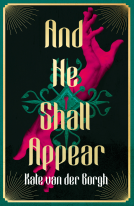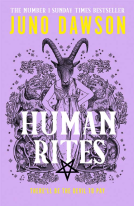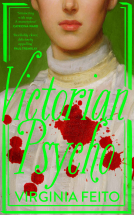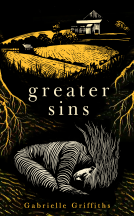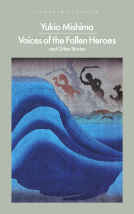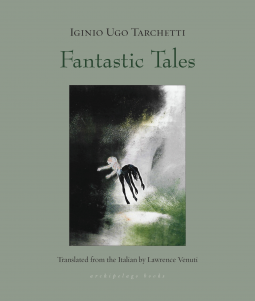
Fantastic Tales
by Iginio Ugo Tarchetti
This title was previously available on NetGalley and is now archived.
Send NetGalley books directly to your Kindle or Kindle app
1
To read on a Kindle or Kindle app, please add kindle@netgalley.com as an approved email address to receive files in your Amazon account. Click here for step-by-step instructions.
2
Also find your Kindle email address within your Amazon account, and enter it here.
Pub Date 29 Sep 2020 | Archive Date 23 Aug 2020
Talking about this book? Use #FantasticTales #NetGalley. More hashtag tips!
Description
In this collection of nine eerie stories, Iginio Ugo Tarchetti switches effortlessly between the macabre and the breezily comical. Set in nineteenth-century Italy, his characters court spirits and blend in with the undead: passionate romances filled with jealousy and devotion are fueled by magic elixirs. Time becomes fluid as characters travel between centuries, chasing affairs that never quite prosper. First published by Mercury House in 1992.
Advance Praise
Iginio Ugo Tarchetti was born in San Salvatore Monferrato in Piemonte, in 1839. After his military life was cut short due to illness (or for writing an antimilitarist novel, depending on who's telling the story), he moved to Milan and became involved with the 'scapigliatura', literally meaning 'dishevelled', an artistic movement that rebelled against traditional values and the Italian artistic and literary canon at that time. He published articles in several newspapers. Considered the first Italian writer to experiment with the Gothic style, Tarchetti is often compared to Edgar Allan Poe. He died at the age of 29 from tuberculosis. About the Translator Lawrence Venuti is a translation theorist and historian. He translates from Italian, French, and Catalan. His translation projects have won awards and grants from the PEN American Center, the Italian government, the NEA, and the NEH. He was awarded a Guggenheim Fellowship for his translation of Giovanni Pascoli's poetry and prose and his translation of Ernest Farrés's Edward Hopper: Poems won the Robert Fagles Translation Prize. In 2018 his translation of J.V. Foix's Daybook 1918: Early Fragments won the Global Humanities Translation Prize.
Available Editions
| EDITION | Other Format |
| ISBN | 9781939810625 |
| PRICE | US$20.00 (USD) |
| PAGES | 260 |
Featured Reviews
 Joseph C, Reviewer
Joseph C, Reviewer
Iginio (or Igino) Ugo Tarchetti (1839 – 1869) was a journalist and author, a leading figure within the Scapigliatura movement. The Scapigliatura consisted of a like-minded group of Italian authors, musicians, painters and sculptors who, in the wake of the Risorgimento, sought to revitalise their country’s predominantly conservative culture. The literal meaning of “Scapigliato” is “dishevelled”, whereas “Scapigliatura” is equivalent to the French term “bohème” (bohemian). It was derived from the title of the novel La Scapigliatura e il 6 Febbraio by Cletto Arrighi, the pen-name of Carlo Righetti (1830-1906), one of the forerunners of the movement. The Scapigliati often sought to shock the Catholic establishment (whose authority had already been questioned, on the political front, by the ongoing upheavals in the newly-formed Italian state). To achieve their aims, they sought models outside the Italian tradition. While the musicians within the group (such as Arrigo Boito and Franco Faccio) looked towards Wagner, authors such as Tarchetti were influenced by the German Romantics (such as Heine and E.T.A. Hoffmann), the French Bohemians (such as Gautier) and the poetry of Charles Baudelaire. Another source of inspiration was Edgar Allan Poe.
The literature of the fantastic has illustrious antecedents in Italian literature. Indeed, Dante’s Divine Comedy, with its tour of Heaven, Purgatory and Hell, can be read as a work of supernatural – and in some aspects Gothic – fiction, and Ariosto’s Orlando Furioso, with its sorcerers and fantastic creatures in an imagined East, is a worthy forerunner of Oriental Gothic. Yet, the resurgence of the literature of the weird and the fantastic in Italy owes much to the Scapigliati and their interest in works of figures such as Hoffmann and Poe.
In this regard, Tarchetti’s Racconti Fantastici, first published by Treves in 1869, is an important, not to say seminal, collection. Lawrence Venuti’s translation was first published by Mercury House in 1992, and is now being issued on Archipelago Books. Reading this collection, one detects two distinct currents in Tarchetti’s style. Some stories harken back to an earlier form of Gothic. This is the case, for instance, with The Legends of the Black Castle with its well-worn tropes of ruined castles and old clerics with mysterious histories. A Spirit in a Raspberry and A Dead Man’s Bone are, essentially, ghost stories where, once again, the Anglo-Saxon tradition of supernatural fiction is evident. The Lake of the Three Lampreys, “A Popular Tradition”, reminded me of the folklore-infused stories of Gustavo Adolfo Bécquer, but its “nature writing” and inevitably sinful monks are also close to Radcliffe. Nowhere is the influence of English Gothic more obvious than in The Elixir of Immortality. Tarchetti subtitles it “In Imitation of the English”. It is, in effect, a plagiarised version of Mary Shelley’s “The Mortal Immortal”.
The theme of “Fate” recurs in Tarchetti’s stories. Often, the protagonists battle against the vicissitudes of Fortune, with scant results. Fate can set some individuals on the course of tragedy (as in The Fated) but, in other cases, has a decidedly benevolent influence (Captain Gubart’s Fortune).
In other works, Tarchetti is particularly reminiscent of Poe. In Bouvard, the eponymous protagonist is haunted by his own ugliness, which keeps him from winning the love of his life. The conclusion of the story brims with morbid horror. Then there is what is possibly the most original story in the collection – The Letter U (A Madman’s Manuscript). When I started reading this tale about a man obsessed with the “evil” letter U, I smiled at this absurd, quasi-comic premise. By the end of it, I definitely felt uneasy.
Lawrence Venuti’s translation is excellent. The authenticity of the language he uses does not stem only from its faithfulness to the original but also from the fact that Venuti bases his style on that of the (English-speaking) Gothic authors of the nineteenth century. As a result, his prose, albeit flowing, has a slightly archaic feel to it which fits the subject perfectly.
Fantastic Tales is an enjoyable read, but it is also an important historical document, a window onto an as yet underappreciated era of Italian fiction.
 Reviewer 499835
Reviewer 499835
This story collection is such a delightful read. First published in 1869, Tarchetti's "Fantastic Tales" fits comfortably in my head in a region close to E.T.A. Hoffman and Edgar Allen Poe, but these tales have a gentle underlying humor to them that make them unique. They're such a surprising pleasure to read. I mean, yes, Poe can be funny, too, in his excesses, but I don't ever get the feeling that he was trying to be funny on purpose. Tarchetti's stories are traversing the same fictional landscape of the weird and the uncanny, but the narrator here is full of self-awareness. He is in on the joke.
I love the way the translation from the original Italian captures the era and the cadence of the language. I kept feeling delight with each sentence. Here is an excerpt from "Captain Gubart's Fortune"--I can't help but feel joy to read sentences like this--
"Poor Gubart! He was born a lazy beggar, took a wife when he reached sixteen, and had three sons. One night, there was nothing for supper in Gubart's house, and these fasts were not growing any less frequent. His wife thrust his violin into his hands and said to him, "Gubart, go and play, please, try to scrape together some change for these children. And may God give you good fortune." Gubart reluctantly took his violin and looked at it rudely. Between player and instrument there existed a kind of coldness, a long-standing grudge. Gubart considered the violin an enemy: no matter how many times he ventured out with it, everyone avoiced him, and that never happened to him when he was alone."
I loved reading these tales. It felt like finding a forgotten trove of stories from the past. Thanks to Archipelago for the electronic review copy.
This is a fascinating collection of gothic tales from the nineteenth century Italian Scapigliatura movement.
I adored his metaphysical weirdness and creepiness. It was just what I needed to read, and I'll actually be re-reading it in October for Halloween as I want to spend even more time revisiting it during the haunting season. It's a dip-in-and-out sort of book, but that's just the kind of collection I enjoy.
 Gustavo A, Reviewer
Gustavo A, Reviewer
Iginio Ugo Tarchetti's "Fantastic Tales" stands as a testament to his mastery in the realm of supernatural literature. This collection of short stories offers a captivating journey through the gothic and the eerie, showcasing Tarchetti's remarkable talent for blending the mundane with the fantastic.
Narrative Craftsmanship: Tarchetti’s storytelling is distinguished by its atmospheric richness and psychological nuance. Each tale in the collection is meticulously crafted, drawing readers into a world where reality and the supernatural intertwine seamlessly. His prose is both evocative and precise, creating a palpable sense of dread and curiosity that lingers long after the final page.
Exploration of Themes: The stories within "Fantastic Tales" delve into themes of horror, mystery, and the uncanny. Tarchetti’s ability to explore these themes with both subtlety and intensity is truly commendable. His narratives often challenge the boundaries between the known and the unknown, engaging readers in a profound exploration of human fears and desires.
Memorable Stories: Highlights of the collection include "The White Fiancee" and "The Dead Woman," which stand out for their gripping plots and emotional depth. These tales not only captivate with their eerie atmospheres but also resonate with their exploration of human psychology and existential dread.
Legacy and Influence: Tarchetti’s influence on Italian literature and the broader genre of gothic fiction cannot be overstated. His innovative approach to storytelling and his ability to evoke a sense of the macabre have secured his place as a pioneering figure in supernatural literature.
